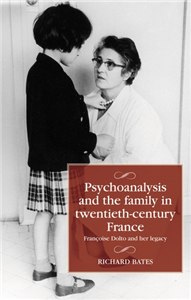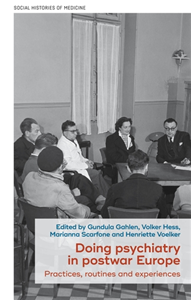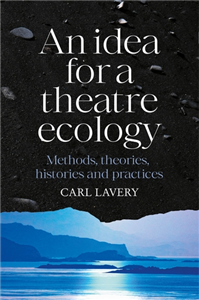Your Search Results
-
Promoted ContentAugust 2016
Nursing and psychology/psychiatry
by Klaus Kaufmann Mall
Why do people act and behave the way they do? What is going on inside of them? To answer these questions, which may be going through many nursing professionals’ minds, basic psychological knowledge is essential. This title will help all those confronted with these kinds of questions in their daily nursing practice. It provides an overview, using case studies, over the most common mental illnesses, outlining symptoms, causes, progression, and treatment options. This title highlights the mental illnesses as well as provides insight into challenges and opportunities the nursing profession provides for those working in the field. Target Group: Nursing practitioners, Nursing Students.
-
Promoted ContentHumanities & Social Sciences
The Psychology of Meditation
Varieties, Effects, Theories, and Perspectives
by Peter Sedlmeier
All you need to know about the psychology of meditation: Written by an expert in the field Provides unique theories of meditation approaches Explores traditional and Western approaches Recommends how to improve future research Explores new topics, e.g., negative effects This volume provides state-of-the-art answers to questions about the psychology of meditation, including: what is meditation, how does it work, and how can it best be researched? The author succinctly summarizes the benefcial effects of meditation, explores recently emerging topics such as negative effects, provides theories of four main traditional meditation approaches, and gives a critical overview of Western approaches to explain the effects of meditation. In conclusion, recommendations are made on how to improve future meditation research.
-
 Trusted Partner
Psychology
Trusted Partner
PsychologyPositive Psychology at the Movies
Using Films to Build Character Strengths and Well-Being
by Ryan M. Niemiec, Danny Wedding
This book uses movies as a medium for learning about the latest research and concepts, such as mindfulness, resilience, meaning, positive relationships, achievement, well-being, as well as the 24 character strengths laid out by the VIA Institute of Character. This book systematically discusses each of the 24 character strengths, balancing film discussion, related psychological research, and practical applications. Resources provided in this book include a suggested syllabus for a complete positive psychology course based on movies, a list of suitable movies for children, adolescents, and families as well as a list of questions for classroom and therapy discussions. Target Group: Psychologists, consultants, therapists and counselors, movie enthusiasts, and all those interested in positive psychology and improving life.
-
 Trusted Partner
Humanities & Social SciencesFebruary 2022
Trusted Partner
Humanities & Social SciencesFebruary 2022Psychoanalysis and the family in twentieth-century France
Françoise Dolto and her legacy
by Richard Bates, David Hopkin, Maire Cross, Jennifer Sessions
In the last quarter of the twentieth century, if French people had a parenting problem or dilemma there was one person they consulted above all: Françoise Dolto (1908-88). But who was Dolto? How did she achieve a position of such influence? What ideas did she communicate to the French public? This book connects the story of Dolto's rise to two broader histories: the dramatic growth of psychoanalysis in postwar France and the long-running debate over the family and the proper role of women in society. It shows that Dolto's continued reputation in France as a liberal and enlightened educational thinker is at best only partially deserved and that conservative and anti-feminist ideas often underpinned her prominent public interventions. While Dolto retains the status of a national treasure, her career has had far-reaching and sometimes harmful repercussions for French society, particularly in the treatment of autism.
-
 Trusted Partner
The ArtsDecember 2024
Trusted Partner
The ArtsDecember 2024Beyond the Happening
Performance art and the politics of communication
by Catherine Spencer
Beyond the Happening uncovers the heterogeneous, uniquely interdisciplinary performance-based works that emerged in the aftermath of the early Happenings. By the mid-1960s Happenings were widely declared outmoded or even 'dead', but this book reveals how many practitioners continued to work with the form during the late 1960s and 1970s, developing it into a vehicle for studying interpersonal communication that simultaneously deployed and questioned contemporary sociology and psychology. Focussing on the artists Allan Kaprow, Marta Minujín, Carolee Schneemann and Lea Lublin, it charts how they revised and retooled the premises of the Happening within a wider network of dynamic international activity. The resulting performances directly intervened in the wider discourse of communication studies, as it manifested in the politics of countercultural dropout, soft power and cultural diplomacy, alternative pedagogies, sociological art and feminist consciousness-raising.
-
 Trusted Partner
October 2022
Trusted Partner
October 2022From Dream to Trauma: Mental abuse in partnerships
by Caroline Wenzel
The level of domestic abuse has been increasing for years, but often only cases of physical abuse hit the headlines. Hardly anyone talks about the mental, or psychological, abuse that usually precedes a physical or sexual assault. Those affected do not usually recognise the destructive dynamic in their relationship until far too late. In this book, three case histories illustrate the typical forms of mental abuse in relationships. In addition, experts explain the topic from psychological, therapeutic, political and legal perspectives, and the head of a counselling centre for male victims of mental abuse also has his say. An important and startling book.
-
 Trusted Partner
November 2021
Trusted Partner
November 2021Psycho-Trojans
How parasites control us
by Monika Niehaus, Andrea Pfuhl
Parasites are everywhere, and there is hardly a creature on earth that isimmune from their unwanted attention. The sneakiest among them haveeven developed the ability to turn their host’s behaviour and mind totheir own advantage. Parasites can cause striking psychological changeseven in humans. Today a good dozen of pathogens are suspected of triggeringpsychiatric disorders, and there are probably many more. Some ofthese psycho-parasites and their incredible tricks are introduced here. Butthe book also covers the “standard” parasites that have ruled the destinyof mankind from the beginning of time – probably even more than thegenerals and kings that we thought were in charge.
-
 Trusted Partner
2019
Trusted Partner
2019The Nobel Laureate Who Met a Polite Raccoon in the Woods
When the brain goes mad: 30 rare and unusual mental syndromes
by Monika Niehaus
The human brain is a highly complex and highly functional structure consisting of almost 90 billion nerve cells. But it can go out of sync, due to genetic factors, hormonal effects, trauma or other causes. In extreme cases, our control centre then creates bizarre delusions – brilliant narratives that are completely convincing to the person concerned. In her second book on such phenomena, Monika Niehaus has compiled 30 rare psychological disorders – from a conviction to have been abducted by aliens, to being sexually attracted to criminals, to the hyperthymestical syndrome where people can remember every detail of their past life. Narrated in an interesting, humorous and sensitive way, the author relates a variety of cases, some of them famous, others less so, while introducing us to the history of art and literature and presenting scientific explanations. This fascinating book shows the genius that resides in our brain – and how madness can often be explained.
-
 Trusted Partner
October 2020
Trusted Partner
October 2020Birds in the Mind
Life Stories from Adolescents with Mental Health Issues
by Bernd Gomeringer,Jessica Sänger, UlrikeSünkel, Gottfried M.Barth, Max Leutner
Mental health problems in children and adolescents are a taboo subject. “As ever, there are social misgivings”, says child and adolescent psychiatrist Dr. Robin Funke. “Many families find it tough when they first come to us. They feel this is a failure.” But what is it like living with depression, compulsive behaviour, anxiety and panic attacks, or with eating disorders, bulimia or anorexia? Schirm e. V., the friends association for child and adolescent psychiatry in Tübingen (Germany), asked young patients to share their stories. A moving book was created about living with mental health problems, about the dayto- day routine in psychiatric practice and the power of confidence.
-
 Trusted Partner
Psychology
Trusted Partner
PsychologyPositive Psychology Intervention for Health and Hospital Psychology
by Dora Gil, Claudia Hofheinz
Illness and hospitalization of children occur suddenly andunpredictably,generating high levels of stress and anxiety intheir families. Therefore, it is essential that health andhospitalpsychologists know how to interfere properly in thissituation. The book provides techniques, application instructionsand practical examples for a quick and effective simplepsychological intervention.
-
 Trusted Partner
Trusted Partner
Negotiating with Confidence –Psychological Strategies and Methods
With 20 Exercises for Self-Learning
by T. Fritzsche
From a psychological perspective, there are many aspects to negotiating. Given the right knowledge of backgrounds and mechanisms, it is an art form possible to get to grips with and put into practice. In an entertaining and informative way, this book introduces the reader to the basics of communication and body language, cooperative negotiation, strategic negotiation, the different personalities of negotiators, and negotiating. Using practical exercises and valuable practical tips, this book takes the reader through the main psychological strategies and methods so he can negotiate in a flexible, goal-oriented, and successful manner. Target Group: For people who want to improve their negotiating skills.
-
 Trusted Partner
MedicineMarch 2024
Trusted Partner
MedicineMarch 2024Doing psychiatry in postwar Europe
Practices, routines and experiences
by Gundula Gahlen, Henriette Voelker, Volker Hess, Marianna Scarfone
Doing psychiatry engages with the history of European psychiatry in the second half of the twentieth century through a close and fresh look at the practices that contributed to reshape the mental health field. Case studies from across Europe allow readers to appreciate how new 'ways of doing' contributed to transform the field, beyond the watchwords of deinstitutionalisation, the prescription of neuroleptics, centrality of patients and overcoming of asylum-era habits. Through a variety of sources and often adopting a small-scale perspective, the chapters take a close look at the way new practices emerged and at how they installed themselves, eventually facing resistance, injecting new purposes and contributing to enlarging psychiatry's fields of expertise, therefore blurring its once-more-defined boundaries.
-
 Trusted Partner
September 2022
Trusted Partner
September 2022Gluttony
Blow-out
by Jürgen Dollase
One of Germany's best-known restaurant critics, Jürgen Dollase knowledgeably traces the ups and downs of our love of food. Following the historical-theological classification of the 'mortal sin' that is gluttony, he illuminates not only the physical and medical but also the so important psychological aspects of food. We learn just why his weight loss self-experiment was not successful in the long term as well as various enlightening facts regarding the fateful role of the discounters. This book is not an appeal for moderation, but a plea for moderate indulgence.
-
 Trusted Partner
Humanities & Social SciencesFebruary 2022
Trusted Partner
Humanities & Social SciencesFebruary 2022Psychoanalysis and the family in twentieth-century France
by Richard Bates
-
 Trusted Partner
The ArtsJuly 2025
Trusted Partner
The ArtsJuly 2025An idea for a theatre ecology
Methods, theories, histories and practices
by Carl Lavery
An Idea for a Theatre Ecology is the first book in the discipline of Theatre and Performance Studies to provide a rigorous and coherent theory of the ecology that is immanent to the theatrical medium. Over six clearly written chapters, the book provides a genealogy, outlines a method, provides a lexicon and demonstrates an alternative practice of ecoperformance analysis grounded in the figure of the archipelago. Focusing on Antonin Artaud's theatre of cruelty, the book argues that theatre has no need to provide ecological messages nor to transform itself into a platform for the narration of ecological stories. Instead, more is to be gained, environmentally and politically, by concentrating on the power of images, gestures and voices to create corporeal affects and sensations that implicate the spectators in a terrestrial event.
-
 Trusted Partner
The ArtsSeptember 2020
Trusted Partner
The ArtsSeptember 2020Science in performance
Theatre and the politics of engagement
by Simon Parry
This electronic version has been made available under a Creative Commons (BY-NC-ND) open access license. This book is about science in theatre and performance. It explores how theatre and performance engage with emerging scientific themes from artificial intelligence to genetics and climate change. The book covers a wide range of performance forms from Broadway musicals to educational theatre, from Somali drama to grime videos. It features work by pioneering companies including Gob Squad, Headlong Theatre and Theatre of Debate as well as offering fresh analysis of global blockbusters such as Wicked and Urinetown. The book offers detailed description and analysis of theatre and performance practices as well as broader commentary on the politics of theatre as public engagement with science. Science in performance is essential reading for researchers, students and practitioners working between science and the arts within fields such as theatre and performance studies, science communication, interdisciplinary arts and health humanities.
-
 Trusted Partner
Humanities & Social SciencesJanuary 2024
Trusted Partner
Humanities & Social SciencesJanuary 2024Dog politics
Species stories and the animal sciences
by Mariam Motamedi Fraser
Do dogs belong with humans? Scientific accounts of dogs' 'species story,' in which contemporary dog-human relations are naturalised with reference to dogs' evolutionary becoming, suggest that they do. Dog politics dissects this story. This book offers a rich empirical analysis and critique of the development and consolidation of dogs' species story in science, asking what evidence exists to support it, and what practical consequences, for dogs, follow from it. It explores how this story is woven into broader scientific shifts in understandings of species, animals, and animal behaviours, and how such shifts were informed by and informed transformative political events, including slavery and colonialism, the Second World War and its aftermath, and the emergence of anti-racist movements in the twentieth and twenty-first centuries. The book pays particular attention to how species-thinking bears on 'race,' racism, and individuals.
-
 Trusted Partner
Humanities & Social SciencesApril 2009
Trusted Partner
Humanities & Social SciencesApril 2009Food, risk and politics
Scare, scandal and crisis - insights into the risk politics of food safety
by Ed Randall
This is a book about the risk politics of food safety. Food-related risks regularly grab the headlines in ways that threaten reasoned debate and obstruct sensible policy making. In this book, Ed Randall explains why this is the case. He goes on to make the case for a properly informed and fully open public debate about food safety issues. He argues that this is the true antidote to the politics of scare, scandal and crisis. The book skilfully weaves together the many different threads of food safety and risk politics and offers a particularly rewarding read for academics and students in the fields of politics and media studies. It will also appeal to scholars from other disciplines, particularly social psychology and the food sciences. The book is a lively and exceptionally readable account of food safety and risk politics that will engage policy makers and the general reader. It promises to help us all manage food safety issues more intelligently and successfully. ;
-
 Trusted Partner
The ArtsJanuary 2019
Trusted Partner
The ArtsJanuary 2019Derek Jarman
by Rowland Wymer
This book gives detailed and original critical readings of all eleven of Derek Jarman's feature-length films, arguing that he occupies a major and influential place in European and world cinema rather than merely being a cult figure. It places particular emphasis on the importance of Renaissance art and literature for Jarman, and emphasises his interest in Jungian psychology. Wymer shows how Jarman used his films to take his audience with him on an inner journey in search of the self, whilst remaining fully aware of the dangers of such a journey. Making substantial use of Jarman's unpublished papers as well as all his published works, Wymer argues that the films are orientated towards a much wider audience than is often supposed. They are addressed to anyone, of whatever gender or sexuality, who is prepared to go on a journey in search of him or her self and to become Jarman's accomplice in 'the dream world of the soul'.
-
 Trusted Partner
2018
Trusted Partner
2018The Woman Who Thought Her Husband Was a Doppelganger
When the brain goes haywire: 36 rare and unusual psychiatric syndromes
by Monika Niehaus
The human brain is a wondrous thing, highly complex and highly functional. However, the control centre of our feelings, thoughts and actions can sometimes go out of sync. Some reasons for this are known, such as genetic factors, hormonal effects or trauma. In other cases, we are still in the dark. In an extreme case scenario, the brain may create bizarre delusions – masterful narrations that the people affected fi nd completely conclusive and reasonable. Monika Niehaus has compiled 36 such disorders ranging from love madness and the gourmand syndrome – where gourmet food becomes the purpose of life – to people who desire nothing more than to have their limbs amputated. She tells gripping tales of famous and not so famous cases. With sensitivity and a considerable dose of humour she takes us into the history of art and literature, and presents scientifi c explanations. This fascinating book shows that our brain is a genius – and madness is quite often NOT inexplicable.



























